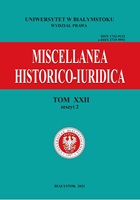Marginalizacja instytucji ławnika we współczesnym procesie karnym na tle ustawodawstwa PRL
Marginalization of the Lay Judge Institution in Modern Criminal Procedure in the Context of the Legislation of the Polish People’s Republic
Author(s): Marcin DziadkiewiczSubject(s): History of Law, Criminal Law, Sociology of Law, Court case
Published by: Wydawnictwo Uniwersytetu w Białymstoku
Keywords: lay judge; Polish People’s Republic; criminal procedure; participation of a social factor in exercising justice; marginalization;
Summary/Abstract: The presence of lay judges in the composition of criminal courts is the most significant form of social participation in the administration of justice in practice. In Poland, this structural solution has been maintained for over 70 years. During this period, the discussed institution has undergone many changes, both in terms of legal regulations and functioning in practice. The Authors decided to investigate it due to the role it fulfills in the political discourse of recent years, as well as due to the changes introduced and proposed in this area. The aim of this article is to show the transformations of the role of the lay judge in the criminal proceedings after World War II, resulting in a reduction of its importance in the Polish normative system, especially after the political changes in 1989, and to assess them. Additionally, a comparison of provisions from two different historical periods and a comparison of views of representatives of different social groups on the functioning of lay judges in criminal courts will allow to comprehensively present the discussed issue and to achieve the research goal. In the text, the Authors refer to numerous scientific monographs and statistical studies conducted among different social groups on the topic of lay judges, and also analyze non-normative factors. In addition, the article adduces opinions of prominent representatives of criminal law doctrine and public figures. Among the sources from the period of the Polish People’s Republic, the works of Prof. A. Turska and Prof. M. Rybicki, as well as the research conducted by the Institute of Law Studies of the Polish Academy of Sciences, were particularly inspiring. While describing the current shape of the lay judge institution, the Authors referred to contemporary studies, surveys, and statements, mainly the works of Dr. J. Kil and Prof. J. Zagrodnik. The leading methods used in creating the article are the comparative and sociological methods.
Journal: Miscellanea Historico-Iuridica
- Issue Year: 22/2023
- Issue No: 2
- Page Range: 503-526
- Page Count: 24
- Language: Polish

